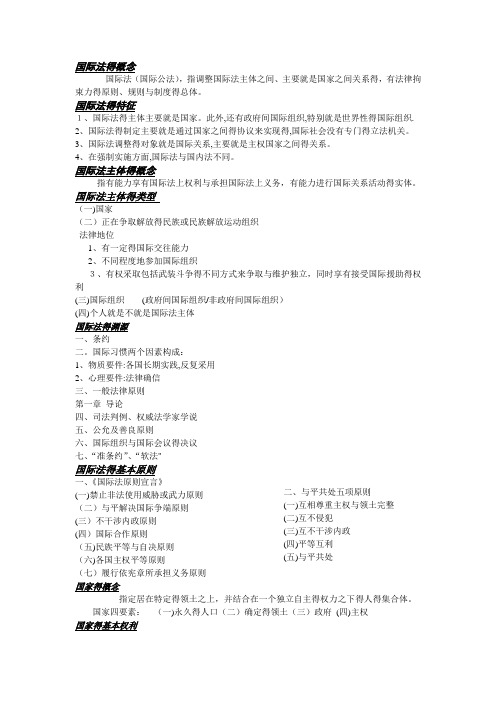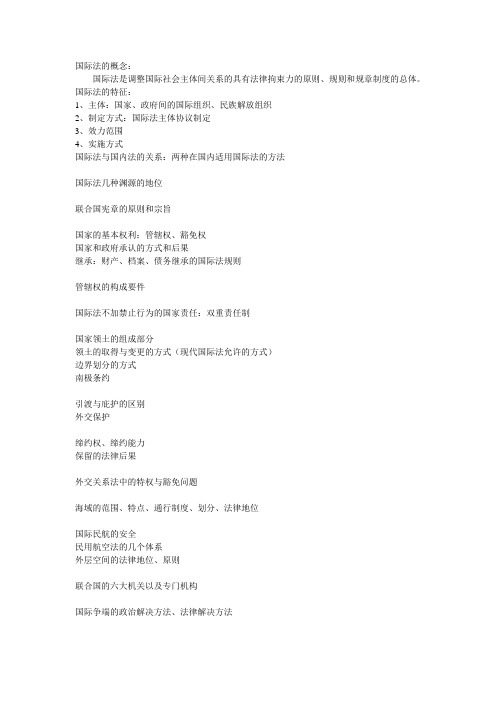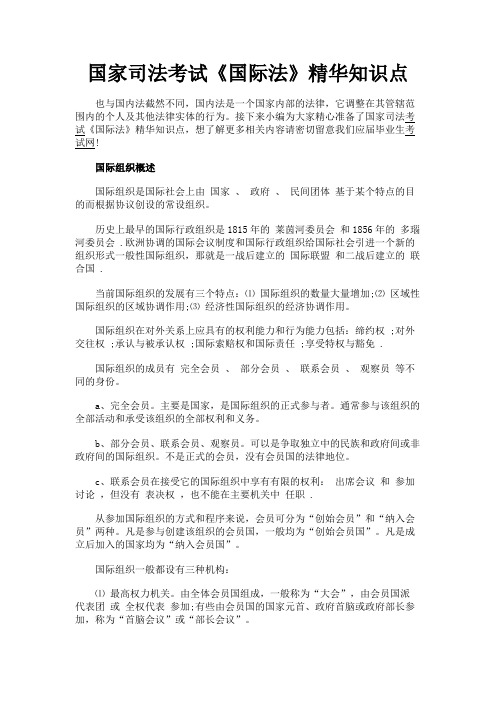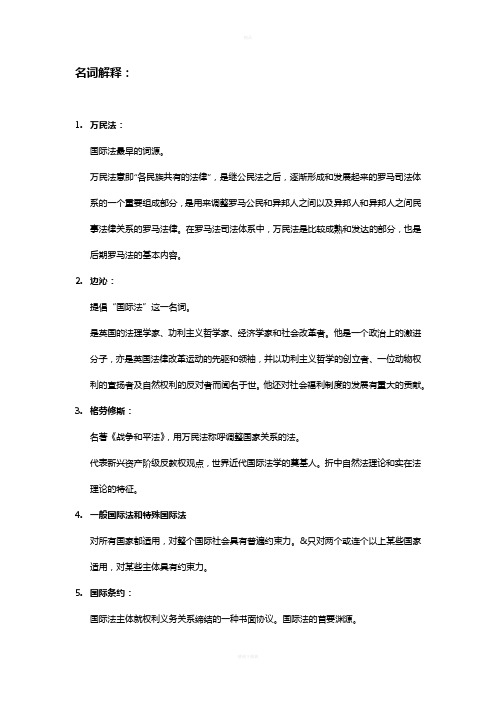法学 国际法 考试要点 8
国际法期末考试复习重点

国际法得概念国际法(国际公法),指调整国际法主体之间、主要就是国家之间关系得,有法律拘束力得原则、规则与制度得总体。
国际法得特征1、国际法得主体主要就是国家。
此外,还有政府间国际组织,特别就是世界性得国际组织.2、国际法得制定主要就是通过国家之间得协议来实现得,国际社会没有专门得立法机关。
3、国际法调整得对象就是国际关系,主要就是主权国家之间得关系。
4、在强制实施方面,国际法与国内法不同。
国际法主体得概念指有能力享有国际法上权利与承担国际法上义务,有能力进行国际关系活动得实体。
国际法主体得类型(一)国家(二)正在争取解放得民族或民族解放运动组织法律地位1、有一定得国际交往能力2、不同程度地参加国际组织3、有权采取包括武装斗争得不同方式来争取与维护独立,同时享有接受国际援助得权利(三)国际组织 (政府间国际组织/非政府间国际组织)(四)个人就是不就是国际法主体国际法得渊源一、条约二。
国际习惯两个因素构成:1、物质要件:各国长期实践,反复采用2、心理要件:法律确信三、一般法律原则第一章 导论四、司法判例、权威法学家学说五、公允及善良原则六、国际组织与国际会议得决议七、“准条约”、“软法"国际法得基本原则一、《国际法原则宣言》(一)禁止非法使用威胁或武力原则(二)与平解决国际争端原则(三)不干涉内政原则(四)国际合作原则(五)民族平等与自决原则(六)各国主权平等原则(七)履行依宪章所承担义务原则国家得概念指定居在特定得领土之上,并结合在一个独立自主得权力之下得人得集合体。
国家四要素: (一)永久得人口(二)确定得领土(三)政府 (四)主权国家得基本权利二、与平共处五项原则 (一)互相尊重主权与领土完整 (二)互不侵犯 (三)互不干涉内政 (四)平等互利 (五)与平共处1、独立权2、平等权3、自卫权4、管辖权国家得基本义务1、不得使用武力或武力威胁,或以与联合国宗旨不符得任何其她方法侵犯别国得领土完整与政治独立2、不得以任何理由与方法直接地或间接地干涉别国得内政3、用与平得方法解决与别国得争端4、善意履行依公认得国际法原则与规则以及有效得国际条约所负得义国家管辖豁免(一)国家管辖豁免主体(1)国家及其政府各种机关(2)有权行使主权权力并以该身份行事得联邦国家得组成单位或国家政治区分单位(3)国家机构、部门与其她实体,但须它们有权力行使并且实际在行使国家主权权力(4)以国家代表身份行事得国家代表(二)国家豁免得范围1、绝对豁免2、限制豁免3、我国坚持国家豁免原则下,对国家豁免规定了某些例外国家承认概念指既存国家对新产生得国家给予得认可,接受由此而产生得法律后果,与新国家建立关系进行交往得行为。
国际法考试重点

国际法复习材料[国际法的渊源]是指国际法规则作为有效的法律规则存在和表现的形式。
一,国际条约二,国际习惯,三,一般法律原则5国际习惯各国在其实践中形成的一种有法律约束力的行为规则。
两个要素:必须有通例存在;存在的通例已被各国接受为法律。
6一般法律原则是指能适用于国际关系的各国法律体系中的某些共有的原则。
如(时效原则,禁止反言原则,善意原则)国际法的基本原则1,国际法基本原则含义是指那些被各国公认和接受的具有普遍约束力的,适用于国际法各个领域的,构成国际法基础的法律原则。
2,国际法的基本原则的特征一,国际社会公认二,具有普遍约束力三,适用于一切国际法领域四,构成国际法体系的基础3,和平共处五项原则一,互相尊重主权和领土完整二,互不侵犯三,互不干涉内政四,平等互利五,和平共处和平共处五项原则是现代国际法基本原则的重要组成部分。
4,国际法基本原则的内容一,国家主权平等原则(*)二,禁止以武力相威胁或适用武力的原则三,和平解决国际争端的原则四,不干涉内政原则(*)五,善意履行国际义务原则六,国际合作原则七,民族自决原则5,国家主权平等原则每一国均享有充分主权之固有权利;每一国均有义务尊重其他国家之人格;国家之领土完整及政治独立不得侵犯;每一国均有权利自由选择并发展其政治、社会、经济及文化制度;每一国均有责任充分并一秉诚意履行其国际义务,并与其他国家和平共处。
第四章1,国家主体国际法主体是指具有享受国际法上的权利和独立承担国际法上义务的能力的国际法律关系的独立参加者。
2,构成国际法主体的要件主要有:1 有独立参与国际法律关系的能力;2 有直接享受国际法上权利的能力;3 有直接承担国际法上义务的能力。
3、为什么国家是国际法的基本主体?答:国家是国际法的基本主体,是指国家在国际法律关系中处于一种主要的、基本的地位。
国家之所以是国际法的基本主体,是由国家的特性以及它在国际关系中的地位和作用决定的。
具体是由以下情况决定: <1>、国家在国际关系中始终处于最主要的地位和起着最重要的作用。
国际法的考试重点

国际法的概念:
国际法是调整国际社会主体间关系的具有法律拘束力的原则、规则和规章制度的总体。
国际法的特征:
1、主体:国家、政府间的国际组织、民族解放组织
2、制定方式:国际法主体协议制定
3、效力范围
4、实施方式
国际法与国内法的关系:两种在国内适用国际法的方法
国际法几种渊源的地位
联合国宪章的原则和宗旨
国家的基本权利:管辖权、豁免权
国家和政府承认的方式和后果
继承:财产、档案、债务继承的国际法规则
管辖权的构成要件
国际法不加禁止行为的国家责任:双重责任制
国家领土的组成部分
领土的取得与变更的方式(现代国际法允许的方式)
边界划分的方式
南极条约
引渡与庇护的区别
外交保护
缔约权、缔约能力
保留的法律后果
外交关系法中的特权与豁免问题
海域的范围、特点、通行制度、划分、法律地位
国际民航的安全
民用航空法的几个体系
外层空间的法律地位、原则
联合国的六大机关以及专门机构
国际争端的政治解决方法、法律解决方法。
国际法考试重点

国际法考试重点一、名词解释1、二元论:国际法与国内法二者属于不同的法律体系,这两个体系是对立的、互不隶属的2、国际法优先说:国际法与国内法二者属于同一个法律体系,但国际法的效力优先会导致取消国家主权的效果3、国内法优先说:国际法与国内法属于同一个法律体系但国际法的效力优先4、国际强行法:又称国际法强制规范国际社会全体接受、公认为不许损抑,仅有以后具有同等性质之原则始得更改。
5、一般法律原则:世界各主要文明代表国家和各大法系代表国家国内法,特别是司法中所存在的一般性,共同性的法律原则。
6、血统主义:国籍法用语,国籍取得的一种原则。
按照血统主义原则,国籍根据血统而取得,凡是本国人所生子女,当然为本国国民,不论其出生于何地。
血统主义原则分为单系血统原则和双系血统原则:(1)单系血统原则指国籍主要随父。
7、无害通过:外国(或地区)船舶在不损害沿海国(或地区)的和平、安全和良好秩序的条件下,继续不停地迅速通过沿海国领海的航行。
8、紧追权:沿海国的军舰、军用飞机和经授权的政府船舶,对其管辖海域内违反有关法律和规章的外国船舶进行追逐、缉捕的权利。
二、简答题9、专属经济区和大陆架的联系与区别专属经济区和大陆架在200海里内是一个重叠区域,沿海国的权利也有重叠专属经济区和大陆架虽然有着密切的联系,但二者又有很大的不同。
①沿海国对专属经济区和大陆架权利的依据是不同的。
沿海国对大陆架的权力不依据于它对大陆架的占领或宣布,而是根据存在的事实。
沿海国对专属经济区的权利则不同,除非沿海国宣布对专属经济区的主张,否则,这部分海域仍是公海;②二者的范围不同:200海里是专属经济区的最大宽度,而却是大陆架的最小宽度,因此,在200海里专属经济区外,沿海国仍可能有大陆架;③沿海国在这两个区域内的权利义务不同:沿海国在专属经济区内对所有的资源,包括生物资源和非生物资源都有主权权利,而沿海国对大陆架的主权权利仅限于海床和底土的矿物资源和非生物资源。
最新 国家司法考试《国际法》精华知识点-精品

国家司法考试《国际法》精华知识点也与国内法截然不同,国内法是一个国家内部的法律,它调整在其管辖范围内的个人及其他法律实体的行为。
接下来小编为大家精心准备了国家司法考试《国际法》精华知识点,想了解更多相关内容请密切留意我们应届毕业生考试网!国际组织概述国际组织是国际社会上由国家、政府、民间团体基于某个特点的目的而根据协议创设的常设组织。
历史上最早的国际行政组织是1815年的莱茵河委员会和1856年的多瑙河委员会 .欧洲协调的国际会议制度和国际行政组织给国际社会引进一个新的组织形式一般性国际组织,那就是一战后建立的国际联盟和二战后建立的联合国 .当前国际组织的发展有三个特点:⑴ 国际组织的数量大量增加;⑵ 区域性国际组织的区域协调作用;⑶ 经济性国际组织的经济协调作用。
国际组织在对外关系上应具有的权利能力和行为能力包括:缔约权 ;对外交往权 ;承认与被承认权 ;国际索赔权和国际责任 ;享受特权与豁免 .国际组织的成员有完全会员、部分会员、联系会员、观察员等不同的身份。
a、完全会员。
主要是国家,是国际组织的正式参与者。
通常参与该组织的全部活动和承受该组织的全部权利和义务。
b、部分会员、联系会员、观察员。
可以是争取独立中的民族和政府间或非政府间的国际组织。
不是正式的会员,没有会员国的法律地位。
c、联系会员在接受它的国际组织中享有有限的权利:出席会议和参加讨论,但没有表决权,也不能在主要机关中任职 .从参加国际组织的方式和程序来说,会员可分为“创始会员”和“纳入会员”两种。
凡是参与创建该组织的会员国,一般均为“创始会员国”。
凡是成立后加入的国家均为“纳入会员国”。
国际组织一般都设有三种机构:⑴ 最高权力机关。
由全体会员国组成,一般称为“大会”,由会员国派代表团或全权代表参加;有些由会员国的国家元首、政府首脑或政府部长参加,称为“首脑会议”或“部长会议”。
⑵ 执行机关。
指国际组织内负责执行其决定的机关,通常称为理事会或执行局或执行委员会 .组织常称为董事会 .⑶ 行政机关。
国际法期末考试重点

名词解释:1.万民法:国际法最早的词源。
万民法意即“各民族共有的法律”,是继公民法之后,逐渐形成和发展起来的罗马司法体系的一个重要组成部分,是用来调整罗马公民和异邦人之间以及异邦人和异邦人之间民事法律关系的罗马法律。
在罗马法司法体系中,万民法是比较成熟和发达的部分,也是后期罗马法的基本内容。
2.边沁:提倡“国际法”这一名词。
是英国的法理学家、功利主义哲学家、经济学家和社会改革者。
他是一个政治上的激进分子,亦是英国法律改革运动的先驱和领袖,并以功利主义哲学的创立者、一位动物权利的宣扬者及自然权利的反对者而闻名于世。
他还对社会福利制度的发展有重大的贡献。
3.格劳修斯:名著《战争和平法》,用万民法称呼调整国家关系的法。
代表新兴资产阶级反教权观点,世界近代国际法学的奠基人。
折中自然法理论和实在法理论的特征。
4.一般国际法和特殊国际法对所有国家都适用,对整个国际社会具有普遍约束力。
&只对两个或连个以上某些国家适用,对某些主体具有约束力。
5.国际条约:国际法主体就权利义务关系缔结的一种书面协议。
国际法的首要渊源。
国际习惯:各国在实践中形成的有法律约束力的行为规则。
6.国际法渊源:国际法作为有效法律规范所由形成的方式。
第一次出现的地方。
实质渊源是指在国际法规范的形成过程中对其内容产生直接或间接影响的各种因素,它们广泛涉及政治、经济、文化、哲学、伦理等各个方面。
形式渊源是指国际法规范形成的各种外部方式。
7.三十年战争是由神圣罗马帝国的内战演变而成的全欧参与的一次大规模国际战争。
这场战争是欧洲各国争夺利益、树立霸权以及宗教纠纷剧化的产物,战争以波希米亚人民反抗奥地利帝国为肇始,最后以哈布斯堡王朝战败并签订《威斯特伐利亚和约》而告结束。
8.威斯特伐利亚和约是象征三十年战争结束而签订的一系列和约。
改变了欧洲政治力量的对比,罗马帝国西班牙的衰落,瑞典荷兰法国的兴起。
创立了以国际会议解决国际争端的先例。
标志国际社会的存在和国际法的产生,近代国际法的实际源头。
国际法期末考试知识点
单选/多选(法考历年真题)
名词解释5
简答
一、国际法的原则、特征
二、海洋法临海
1.概念:沿海国的主权及于其陆地领土及其内水以外邻接的一带海域,在群岛国的情况下则及于群岛水域以外邻接的一带海域,称为领海。
2.领海的法律地位
①领海是国家领土的一部分,受沿海国主权支配。
②沿海国对其领海内的一切人和物享有排他的管辖权。
③领海主权及于领海的上空、水域、海床和底土。
④领海主权是受某种限制的领土主权。
⑤沿海国在领海的主权要受到《海洋法公约》所规定的无害通过权及其他国际法规则的限制。
3.领海基线
领海基线是国家内水与领海的分界线,又称领海的内部界限。
它是指沿海国测算其领海、毗连区、专属经济区和大陆架宽度的起算线。
领海基线有三种:正常基线、直线基线和混合基线。
4.领海宽度
《联合国海洋法公约》规定:每一国家有权确定其领海的宽度,直至从按照本公约确定的基线量起不超过12海里的界限为止。
领海的外部界限是一条其每一点同基线最近点的距离等于领海宽度的线。
确定领海的外部界限的三种方法:平
行线法、圆弧法、直线法。
论述题
国际争端解决
案例题
国际法基本原则
(外国人的法律地位)。
云南省考研法学专业国际法重要知识点归纳
云南省考研法学专业国际法重要知识点归纳一、国际法概述国际法是指规范国家间关系和国家与国际组织之间关系的法律体系。
它由国家主权、国家平等、领土完整、互不干涉内政、和平解决争端等基本原则构成。
国际法可以分为公法和私法两个领域,前者包括国际人权法、国际人道法和国际环境法等,后者则主要涉及国际商法和国际私法。
二、国际法的主体1. 国家:国际法的主体是国家,即独立自主的政治实体。
国家在国际法中享有主权,具有平等地位和平等权利。
2. 国际组织:国际组织是由多个国家自行组成的、通过合同约定,以共同追求共同目标和利益的机构。
国际组织在国际法中扮演重要角色,如联合国、世界贸易组织等。
三、国际法的来源1. 条约:条约是国际法的主要来源,包括国际公约、协定、公报等。
签署和批准的程序决定了条约对各方的约束力。
2. 国际惯例:国际惯例是在长期实践中形成的被普遍接受的行为准则。
它是法律约束力的来源,但需要获得国家的普遍认可。
3. 一般原则:一般原则是指公认的法律原则,如不可侵犯性、守信原则等,它们被视为国际法的公认基本原则。
4. 法学文献:法学文献是国际法的辅助来源,包括国际法学家的著作、学术评论、国际法院判决等。
四、国际法的适用和效力国际法在各国内部的适用受到国内法体系的影响。
在大多数国家,国际法必须通过立法程序才能在国内具有法律效力。
国际法可以直接适用于国内法,也可以通过内部法律的解释和适用实现。
五、国际法的争议解决国际法的争议解决分为协商、谈判、调解、仲裁和诉讼等多种方式。
其中,最常见的是诉讼,国际法院是国家间争议解决的主要机构。
六、国际人权法国际人权法是保障人权的重要组成部分。
国际人权法的主要法律文书包括《世界人权宣言》、《国际人权公约》等。
这些法律文书保障了人权的平等、自由和尊严。
七、国际人道法国际人道法是为了保护战争中受到伤害的人员而制定的。
它规范了战争行为,保护了战争中的平民、俘虏和伤病员等受到伤害的人员。
八、国际环境法国际环境法是为了保护全球环境而制定的一系列法律规范。
国际法考试重点
国际法是指调整国际法主体之间、主要是国家之间关系的,有法律拘束力的原则、规则和制度的总体。
特征1 国际法的主体主要是国家2 国际法的制定主要是通过国家之间的协议来实现的、国际社会没有专门的立法机关3国际法的调整对象是国际关系,主要是主权国家之间的关系4国际法没有居于国家之上的强制执行机关一般国际法的强行规范:国家之国际社会整体接受并公认为不许损益,且仅以后具有同等性质之一般法律规范始得更改之(禁止侵略、战争等)国际法学派:1自然法学派:认为法律本身就是自然法,实在法是从自然法获得效力的2实在法学派:把国际法主要建立在习惯和条约的基础上,即强调认定法而不是自然法3折中学派(格老秀斯学派)认为国际法中一类为“万国法”,即习惯国际法,属于意志法;另一类是关于国家之间关系的自然法。
称之为自然国际法,根源于人类理性4新自然法学派:以自然法为依据,贬低了国家主权在现代国际法中的地位,又否定或降低了一些国际法原则或规则的意义5规范法学派:认为国际法的效力根源于“协定必须遵守”这一基本规范6政策定向派:认为国际法的效力来源于制定国家的对外政策国际法的渊源是指国际法规范表现的形式或形成的过程、程序。
主要渊源:1国际条约2 国际习惯3 一般法律原则辅助资料:1司法判例、权威国际法学家的学说2公允与善良原则3国际组织和国际会议的决议4准条约和软法国家是定居在特定的领土之上,并结合在一个独立自主的权力之下的热的集合体。
构成要素:固定的居民、确定的领土、政府、主权国家豁免权:通常是指非经一国同意,该国的行为不受所在国法院的管辖,其财产不受所在国法院的扣押或强制执行(绝对豁免和相对豁免)国家的承认指既存国家表示认可某种事实或情势,并愿意接受由此产生的法律后果的行为。
性质就即成国家是否承认新国家来讲,承认是国家单方面的政治行为。
从承认对国际法主体资格的影响来说,1构成说2宣告说。
方式:明示承认、默示承认。
法律上的承认、事实上的承认。
国际法自考必考知识点
国际法自考必考知识点
嘿,朋友们!今天咱来聊聊国际法自考必考知识点呀!
先说说国家主权吧!国家主权那可是超级重要的,就好比一个人要有自己的主见和决定权一样。
比如说,一个国家有权决定自己的政治制度、经济政策,别人可不能随便干涉呢!这多重要啊,要是没有主权,那不就乱套啦?
还有管辖权呢!国家对自己领土内的人和事有管辖权,这就像家长管教自己家里的孩子一样理所当然。
要是别的国家在咱们地盘上乱来,那肯定不行呀!
再看看外交关系。
国家之间的外交那可是一门大学问。
就像两个人交朋友,得互相尊重、互相帮忙嘛!外交官们就是负责搭建和维护这种关系的重要角色哟!
国际法的渊源也不容忽视。
国际条约、国际习惯这些,就像是我们做事的规则和依据。
没有这些,那国际交往不就没个准啦?比如说国际海洋法,它规范了各国在海洋上的行为和权利,多关键呀!
哎呀,国际法自考的知识点真的都很重要呢!我们得好好掌握呀!难道不是吗?这些知识点就像是一把把钥匙,能打开我们对国际事务理解的大门。
只有掌握了它们,我们才能更好地理解国际社会是怎么运作的,才能在这个全球化的时代游刃有余呀!所以呀,大家一定要加油学,把这些必考知识点都拿下!。
- 1、下载文档前请自行甄别文档内容的完整性,平台不提供额外的编辑、内容补充、找答案等附加服务。
- 2、"仅部分预览"的文档,不可在线预览部分如存在完整性等问题,可反馈申请退款(可完整预览的文档不适用该条件!)。
- 3、如文档侵犯您的权益,请联系客服反馈,我们会尽快为您处理(人工客服工作时间:9:00-18:30)。
名词解释:一、law-making treaty 课本14页二、recognition de facto 课本49页三、universal jurisdiction 课本69页四、Restrictive immunity 课本78页五、reservation 课本103页六、right of pursuit 课本131页七、the continental shelf 课本127八、right of derogation克检权1、In time of public emergency which threatens the life of the nation and the existence of which is officially proclaimed, the States Parties to the present Covenant may take measures derogating from their obligations under the present Covenant to the extent strictly required by the exigencies of the situation, provided that such measures are not inconsistent with their other obligations under international law and do not involve discrimination solely on the ground of race, colour, sex, language, religion or social origin.2、No derogation from articles 6, 7, 8 (paragraphs I and 2), 11, 15, 16 and 18 may be made under this provision.3、Any State Party to the present Covenant availing itself of the right of derogation shall immediately inform the other States Parties to the present Covenant, through the intermediary of the Secretary-General of the United Nations, of the provisions from which it has derogated and of the reasons by which it was actuated. A further communication shall be made, through the same intermediary, on the date on which it terminates such derogation.九、two-tier liability system双梯度责任制1、strict liability:For damages arising not exceeding 113,000 Special Drawing Rights(1SDR =0.888671g ) for each passenger, the carrier shall not be able to exclude or limit its liability.2、Presumption of fault:The carrier shall not be liable for damages arising exceed for each passenger 113,000 Special Drawing Rights if the carrier proves that:(a) such damage was not due to the negligence or other wrongful act or omission of the carrier or its servants or agents; or(b) such damage was solely due to the negligence or other wrongful act or omission of a third party论述:一、contents of diplomatic privileges and immunities外交特权与豁免的内容1、diplomatic privileges and immunities entitled to the diplomatic mission(1) Use of the flag and emblem(2) The premises of the mission shall be inviolable(3)archives and documents of the mission shall be inviolable(4)free communication(5) Exemption from all dues and taxes(6) Free movement and travel2、diplomatic privileges and immunities entitled to diplomatic agents(1) The person of a diplomatic agent shall be inviolable .(2) Inviolability of residence and properties(3) Exemption from jurisdiction of the receiving state(4) Exemption from all customs duties, taxes, and related charges and inspection(5) Exemption from all dues and taxes(6) Other privileges and immunities二、the legal status of territorial seaThe coastal state enjoys full territorial sovereignty over its territorial sea :(1). An exclusive right to fish, and to exploit the resources of the seabed and subsoil of the territorial sea.(2). Exclusive enjoyment of the air space above the territorial sea; unlike ships, foreign aircraft have no right of innocent passage.(3.) The coastal state’s ships have the exclusive right to transport goods and passengers from one port of the coastal state to another.(4.) If the coastal state is neutral in a time of war, belligerent states may not engage in combat, or capture merchant ships in the coastal state’s territorial sea.(5.) The coastal state may enact regulations concerning navigation, health, customs duties and immigration, which foreign ships must obey.(6)The coastal state has certain powers of arrest over merchant ships exercising a right of innocent passage, and over persons on board such ships Jurisdiction(7)Marine scientific research(8)The protection and preservation of the marine environmentThe criminal jurisdiction of the coastal State1.coastal state should exercise criminal jurisdiction on board a foreign ships which failed to conform with the innocent passage.2.coastal state should exercise criminal jurisdiction on board a foreign ships passing through the territorial sea under certain circumstance.. (a) if the consequences of the crime extend to thecoastal State;(b) if the crime is of a kind to disturb the peace of the country or the good order of the territorial sea;(c) if the assistance of the local authorities has been requested by the master of the ship or by a diplomatic agent or consular officer of the flag State; or(d) if such measures are necessary for the suppression of illicit traffic in narcotic drugs or psychotropic substances 3.The above provisions do not affect the right of the coastal State to take any steps authorized by its laws for the purpose of an arrest or investigation on board a foreign ship passing through the territorial sea after leaving internal waters.4. the coastal State may take any steps on board a foreign ship passing through the territorial sea to arrest any person or to conduct any investigation in connection with any crime committed before the ship entered the territorial sea accord to the regulations of the exclusive economic zone and the regulation related to conservation of the living resources of the high seas,if the ship, proceeding from a foreign port, is only passing through the territorial sea without entering internal waters三、the sources of international law课本13页四、conditions of extraditionUnder certain treaties or reciprocity practice a state may surrender to another state suspects , alleged offenders or convicted criminals who committed against laws of the requesting state and fled abroad. It is based upon bilateral treaty law and does not exist as an obligation upon states in customary lawdouble criminality Extraditable offences:Double criminality means the act of the person who is requested for extradition should be a punishable crime in both requesting and requested states.1. For the purposes of the present Treaty, extraditable offences are offences that are punishable under the laws of both Parties by imprisonment or other deprivation of liberty for a maximum period of at least one/two year(s), or by a more severe penalty. Where the request for extradition relates to a person who is wanted for the enforcement of a sentence of imprisonment or other deprivation of liberty imposed for such an offence, extradition shall be granted only if a period of at least four/six months of such sentence remains to be served.2. In determining whether an offence is an offence punishable under the laws of both Parties, it shall not matter whether: (a) The laws of the Parties place the acts or omissions constituting the offence within the same category of offence or denominate the offence by the same terminology;(b) Under the laws of the Parties the constituent elements of the offence differ, it being understood that the totality of the acts or omissions as presented by the requesting State shall be taken into account.3. Where extradition of a person is sought for an offence against a law relating to taxation, customs duties, exchange control or other revenue matters, extradition may not be refused on the ground that the law of the requested State does not impose the same kind of tax or duty or does not contain a tax, customs duty or exchange regulation of the same kind as the law of therequesting State.4. If the request for extradition includes several separate offences each of which is punishable under the laws of both Parties, but some of which do not fulfill the other conditions set out in paragraph 1 of the present article, the requested Party may grant extradition for the latter offences provided that the person is to be extradited for at least one extraditable offence Mandatory grounds for refusal :Extradition shall not be granted in any of the following circumstances: (a) If the offence for which extradition is requested is regarded by the requested State as an offence of a political nature; (b) If the requested State has substantial grounds for believing that the request for extradition has been made for the purpose of prosecuting or punishing a person on account of that person's race, religion, nationality, ethnic origin, political opinions, sex or status, or that that person's position may be prejudiced for any of those reasons; (c) If the offence for which extradition is requested is an offence under military law, which is not also an offence under ordinary criminal law; (d) If there has been a final judgment rendered against the person in the requested State in respect of the offence for which the person's extradition is requested; (e) If the person whose extradition is requested has, under the law of either Party, become immune from prosecution or punishment for any reason, including lapse of time or amnesty; (f) If the person whose extradition is requested has been or would be subjected in the requesting State to torture or cruel, inhuman or degrading treatment or punishment or if that person has not received or would not receive the minimum guarantees in criminal proceedings, as contained in the International Covenant on Civil and Political Rights, article 14; (g) If the judgment of the requesting State has been rendered in absentia, the convicted person has not had sufficient notice of the trial or the opportunity to arrange for his or her defense and he has not had or will not have the opportunity to have the case retried in his or her presence五、categories of jurisdiction课本64-69六、the legal effect of de jure jurisdictionLegal effects of Recognition de jure1.full diplomatic relations could be establishes between the recognizing state and the recognized entity. treaties on a general topic could be concluded.2. enjoy locus standi in the recognizing state enjoy immunity from suit in the recognizing state and cannot be sued without it consent.3.its legislative and administrative acts will be given effect to within the recognizing state. De jure authority remain competent for matters arising outside that territory4recognition once granted is retroactive. It is backdated to the establishment of the entity in question and it does not related the time recognition is accorded.。
